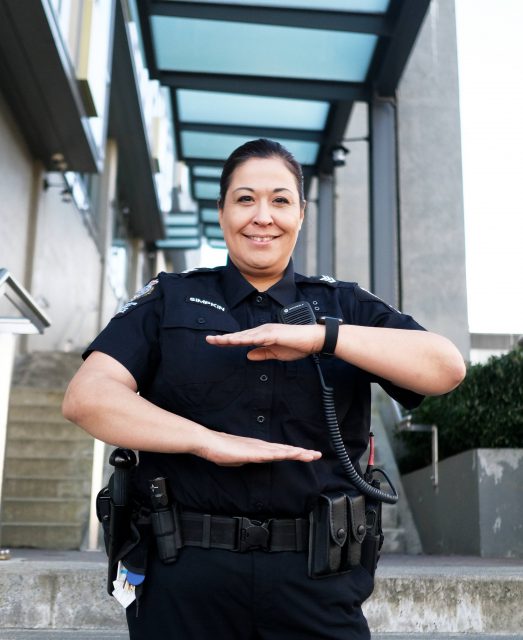#IWD2020: “I wear a duty belt of tools. But the most important tool is my voice.”
#IWD2020: “I wear a duty belt of tools. But the most important tool is my voice.”

International Women’s Day on March 8 is a dedicated day to acknowledge the work that needs to be done for gender equality around the world. This year’s theme is #EachforEqual. It highlights that working towards equality is something that is the responsibility of every individual.
Part of this work is recognizing and celebrating the achievements of women in our workplaces. We’re proud to share the stories of those that work at TransLink and its family of companies.
![]()
Sergeant Cheryl Simpkin has worked in law enforcement and community policing for over 18 years. Under her leadership, the Community Engagement Team at the Metro Vancouver Transit Police connects with diverse communities across six Community Service Areas within Metro Vancouver, and works with clients from vulnerable backgrounds.
A member of the Vuntut Gwitchen First Nation, Cheryl grew up in the Lower Mainland and, as an Indigenous woman, faced life experiences and challenges that helped her develop a life philosophy which she confidently brings into her current job.
“I am a strong Indigenous woman. When various difficult things happen in your life, you need to learn how to cope with that. And as a young person, I became a leader very quickly. I learned how to take a leadership role, how to manage crisis, and how to deal with difficult situations.”
The inspiration to join the police force came when Cheryl was only seven years old. While attending a Remembrance Day Ceremony with her parents, she saw a member of the Royal Canadian Mounted Police. “I had no idea who he was, so I asked my mum. I knew instantly that’s what I’m going to do when I get older.”
Fast forward several years, Cheryl was studying criminology at the Native Education Center at Douglas College. She applied to the Stl’atl’imx Tribal Police, the only Tribal Police Service in British Columbia, to work with them as a part of her first year practicum. She appreciated their philosophy of community policing and accepted a permanent full-time position.
Despite the need to relocate to the rural area based in Mount Currie and Lillooet, Cheryl was pleased to be a female police officer working for the community.
The job was very challenging and extremely rewarding. She worked closely with the community and admired the cultural awareness and their focus on addressing challenges in the community.
The time in Mount Currie also taught her about the power of her voice. It also shaped her approach in meeting people at their point of need, while staying firm in her beliefs. As Cheryl explains:
“It’s all about understanding someone’s situation and treating people with respect and dignity, whether it’s a small child or a family that is dealing with crisis. Sometimes it’s also about telling the difficult truth. Back then I used to wear a duty belt full of tools, but I realized that my most important tool is my voice.”
Cheryl brings this cultural sensitivity to her current role at Transit Police.
Sergeant Simpkin supports her team of eight strong independent members, whom she describes as “absolute shining stars,” as they engage with boots on the ground to tackle issues of homelessness, addiction and mental health, and Indigenous relations. Their goal is to break barriers to address decriminalization and stigma. This enables the team to reach out to clients on a more personal level and take time to understand their needs:
“I had situations when I called up a client’s physicians to make sure they are taken care of, whether it was appropriate medication changes or just a simple appointment.”
What it means to be a woman in law-enforcement?
When asked about this year’s International Women’s Day celebration, Cheryl shared some of her thoughts:
“Women have a huge part to play in policing. We need to be the leaders in our fields and bring our unique abilities and strengths to the job we do. For me, at least, it was always about finding ways in which we can all work together to build resources and focus on engagement rather than criminalization. It’s important we create a foundation for trust that helps people to see the police beyond our uniform and allows us to meet each other at the point of our needs.”
Cheryl is appreciative of the support she receives from Transit Police and the diversity that her department offers. If you are ever interested in meeting the amazing women that work in policing, give Cheryl a shout!
Cheryl’s team is also active on social media and documents their everyday work with the community.You can follow them here:
Sergeant Cheryl Simpkin https://twitter.com/SgtCSimpkin
Constable Gwen Ranquist https://twitter.com/CstGRanquist
Constable Julien Ponsioen https://twitter.com/CstJPonsioen
Constable Kirk Rattray https://twitter.com/CstKRattray
Constable Bruce Shipley https://twitter.com/CstBShipley
Constable Justin Biggs https://twitter.com/CstJBiggs
Constable Nicole Dennis https://twitter.com/CstNDennis
Constable Darren Chua https://www.instagram.com/cstdchua/?hl=en





